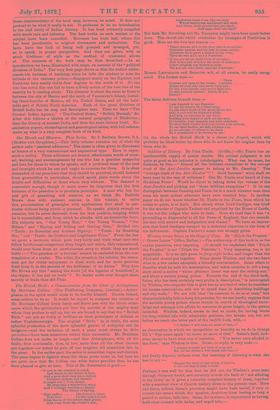The British Birds: a Communication from the Ghost of Aristophanes.
By Mortimer Collins. (The Publishing Company, Limited.)—Aristo- phanes in the spirit would seem to be hardly himself. Ghosts, indeed, seem seldom to be so. It would be unjust to compare the creation of Mr. Mortimer Collins' lively fancy and fluent pen with the idiotic utter- ances which the spiritualists put into the mouths of the mighty dead whom they profess to call up, but we are bound to say that the "British Birds" are not as lively or brilliant as their prototypes of Athens, or rather Nophelocoecygia. The original " Birds " is, in truth, the most splendid production of the most splendid genius of antiquity, and its imitators—and the imitation of such a piece must always be duke periculunt—have been numerous rather than successful. Mr. Mortimer Collins does not make us laugh—and that Aristophanes, with all his faults, does continually, does, in fact, more than all the other classics pat together—or rather he pats off our laughter till somewhat late in the piece. In the earlier part, the satire is somewhat vague and obscure. The piece begins to lighten when the three poets come in, but here we are quite sure that Mr. Collins can write better parodies than be has been pleased to give us here. This of Mr. Swinbarne is good :— " 0 cool in the summer is salad, And warm in the winter is love; And a poet shall sing you a ballad, Delicious thereas and thereof. A singer am I, if no sinner,
My muse has a marvellous wing, And I willingly worship at dinner The Sirens of Spring.
"Take endive like love it is bitter, Take beet. . . . for like love kin red; Crisp leaves of the lettuce shall glitter, And cress from the rivulet's bed; Anchovies foam-born, like the lady Whose beauty has maddened this bard;
And olives, from groves that are shady, And eggs—boil 'em hard."
But both Mr. Browning and Mr. Tennyson might have been much better done. The choral ode which celebrates the triumphs of Positivism is good. Here are the two last stanzas — *There was an APE in the days that were earlier; Centuries passed. and his hair became curlier; Centuries more gave a thumb to his wrist, Then he was ltAN, and a Positivist.
"If you are pious (mild form of inssmity), Bow down and worship the mass of humanity, Other religions are buried in mist; We are our own Gods, says the Positivist."
Messrs. Lwrusharis and BisNorns will, at all events, be easily ream- raised. The former says:—
Th ree Courses are open to the realm. I govern
Either be your ally and never help you ;
Or else your enemy, and never fight you ; Or else entirely neutral ; which do you Prefer?"
The latter delivers himself thus:-
" I am deputed by my Emperor
To say he cannot let a State arise On the other bank of the great River Air.
Still, If you will bo tributary allies, And help us stanchly in our wars, Sending your eagles to pick out the eyes Of enemies, your magpies and your jackdaws To steal their letters, and your crows and vultures To eat their bodies, we may tolerate you.
At an amount of tribute to be Axed
By a committee to be chosen by me."
On the whole the British Birds is a clever fen desprit, which will probably bo liked better by those who do not know the original than by those who do.


































 Previous page
Previous page